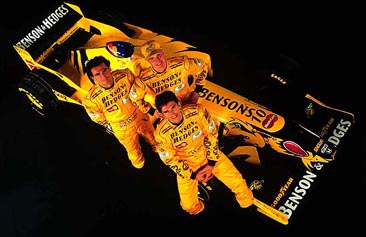
The Jordan team also announced a new sponsorship deal with NatWest Bank. Patrick Boylan of NatWest Bank stated: "We are delighted to support a British team with a British World Champion driver.
 |
The Jordan-Mugen-Honda team presented their new 1998 challenger today. A hornet replaces the snake on the nose this year. Their drivers Damon Hill and Ralf Schumacher are both eager to get the car on the track. Hill is looking forward to taking on Michael Schumacher together with Michael's brother Ralf. Hill commented: "Ralf wants to beat his brother more than anything else, so we should get on just fine. I'm straining at the leash and can't wait to come out fighting." He also added that it will not be easy to compete at the front of the field: "You must be realistic. It will be tough for us to fight for the title." The Jordan team also announced a new sponsorship deal with NatWest Bank. Patrick Boylan of NatWest Bank stated: "We are delighted to support a British team with a British World Champion driver.
|
Ottawa (CP) -- Health Minister Allan Rock says he may amend Ottawa's anti-tobacco legislation to ease restrictions on on-site tobacco sponsorship advertising at sports and cultural events.
Rock says the changes he is considering may apply to all tobacco-sponsored events, not just car races as was indicated when the amendment was first promised in the fall.
"It may be that the . . . amendment we table is of general application," Rock said in an interview.
He suggested that such an amendment wouldn't make a big difference for events other than car races because they don't rely on on-site advertising to the same extent.
"I suspect the principal beneficiaries will be autosports because (the amendment) will relate only to on-site changes," he said last month.
"Autosport is particularly interested in the changes in that regard because their primary market is a broadcast market, and what happens on site is portrayed around the world."
He said other types of events don't depend on broadcasting to the same extent and are more concerned about off-site advertising such as mail-out brochures.
Anti-smoking activist Rob Cunningham of the Canadian Cancer Society said greater latitude for on-site advertising could undermine the whole intent of the federal legislation. "One of the reasons tobacco companies engage in sponsorship, is they get tremendous television exposure. At the Canadian Open (tennis tournament) there's a huge 'du Maurier' sign that is basically in the screen the whole time. "There are far more viewers that watch the Canadian Open on TV than from the stands." Cunningham suggested the tobacco industry might develop new broadcast-oriented events to take advantage of the changes.
Bob Moffat, president of Tennis Canada, which relies on tobacco-company sponsorship for some of its events, was surprised when told of Rock's comments. "That's a really significant shift," said Moffat. But he added that the Tobacco Act would remain a highly restrictive law even if such an amendment were passed.
The Tobacco Act, passed last year after enormous controversy, limits tobacco logos to the bottom 10 per cent of signs and display surfaces at tobacco-sponsored events. The key provisions take effect next year. Organisers of the Montreal Grand Prix bitterly fought the bill, saying the annual race would be endangered if tobacco logos could not be displayed on race cars and drivers' uniforms. The Quebec government supported their position. Last April former Health Minister David Dingwall wrote Grand Prix organisers promising amendments "to respect the international standard concerning the use of logos on cars, drivers, pit crew and transport equipment." Health groups denounced the so-called "Grand Prix exemption" as "a cave-in with tragic consequences for public health" and predicted that other tobacco-sponsored events would demand similar concessions.
David Sweanor of the Non-Smokers' Rights Association said the government is caught in a dilemma of its own making because an exemption for one event would be clearly unfair to other events. Rock said he would like to help the organisers of tobacco-sponsored events, but the amendment he has in mind may not be sufficient to solve their problems. He's looking at other options. "We can help them try to find other sources of funding. We can look and see what the government spends on sponsorship. There's a variety of things we can do to try to soften the blow on innocent bystanders."
provided by Brendan Kerin: Courtesy of LiZER Motorsports International